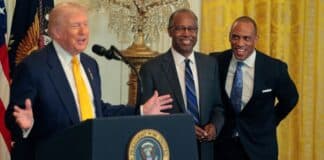A Wikipedia article focused on the growing scandal of Pakistani-heritage grooming gangs targeting young white women in the U.K. was nominated for deletion by editor “Simonm223,” a Canadian Marxist socialist and science fiction author. His move ignited outrage over alleged political correctness and government cover-ups of these criminal networks.
Simon McNeil argued the page duplicated information from the main U.K. child sexual abuse article and pushed a “fringe” viewpoint. Critics countered that the scandal warranted its own entry, pointing to Baroness Casey’s report on institutional cover-ups going back years. High-profile figures like Michael Gove exposed how officials downplayed the gangs’ crimes for fear of being labeled racist.
The nomination brought to light McNeil’s controversial record: praising far-left Antifa, minimizing China’s repression of Uyghurs, and anti-Israeli edits. A resurfaced blog post revealed his support for exposing his daughter to sexual “kink and fetish” displays at Pride events, claiming those who objected were “Nazis” or aiding them. With tens of thousands engaging on X, Elon Musk reportedly weighed in, fueling debate over Wikipedia’s left-wing bias and censorship.
Supporters of keeping the page noted that reputable outlets like the Guardian and BBC had used the term “grooming gangs,” and argued the article highlighted an ongoing, separate pattern of abuse. Opponents labeled it a “POV fork” that risked inflaming racial tensions and suggested any content be pushed into a sub‑section under child abuse.
McNeil responded to online backlash by alleging “off‑wiki harassment” and “coordination” against him, citing messages via his Wikipedia and Bluesky accounts. He also appealed to the Wikimedia Foundation for protection. Critics argue the deletion bid is a politically motivated effort to suppress uncomfortable truths about ethnicity-linked crime.
This battle reflects the larger cultural clash over how societies confront politically sensitive topics. While some see Wikipedia as succumbing to ideological bias, others view calls to remove the article as an unwillingness to confront hard facts. The outcome remains uncertain, but the controversy underscores the ongoing tension between free expression, cultural sensitivity, and factual reporting.





